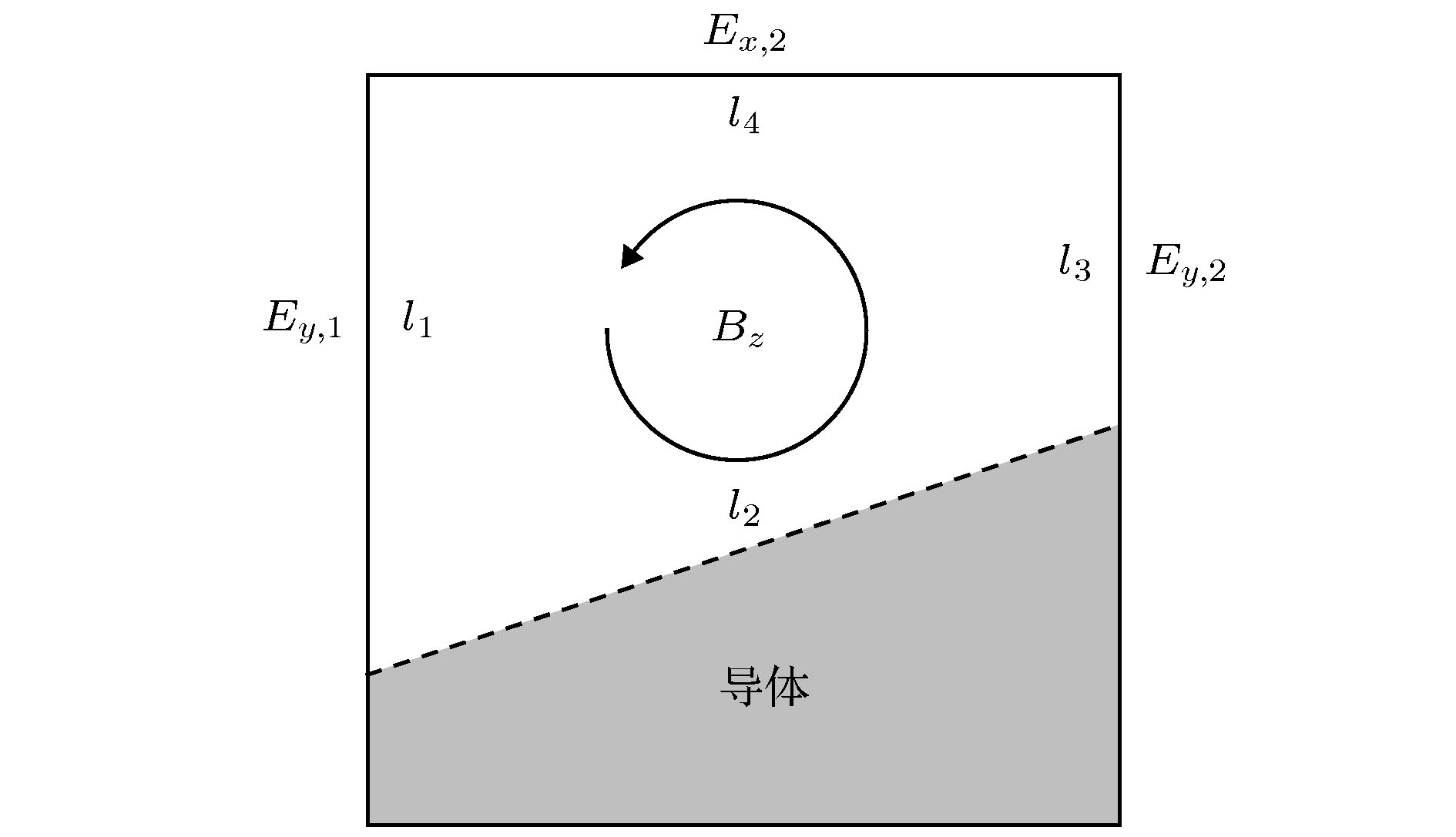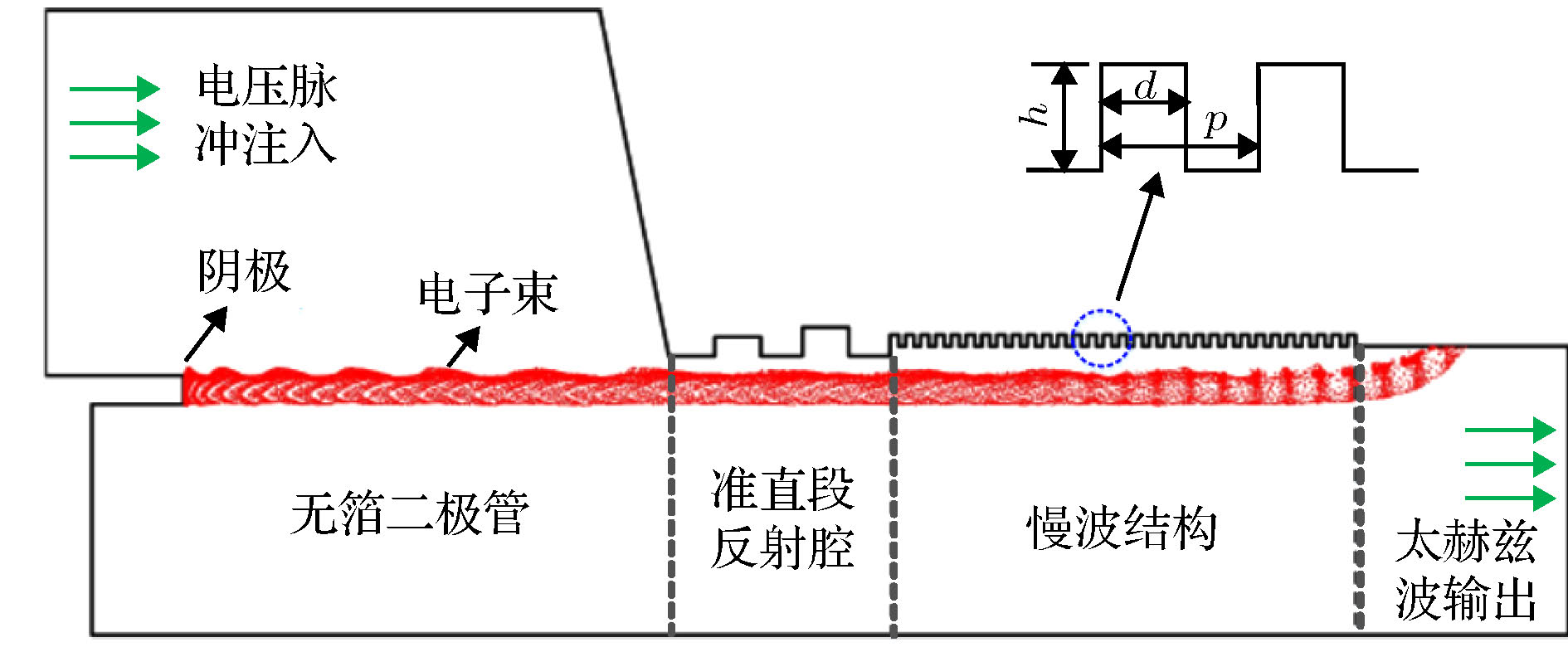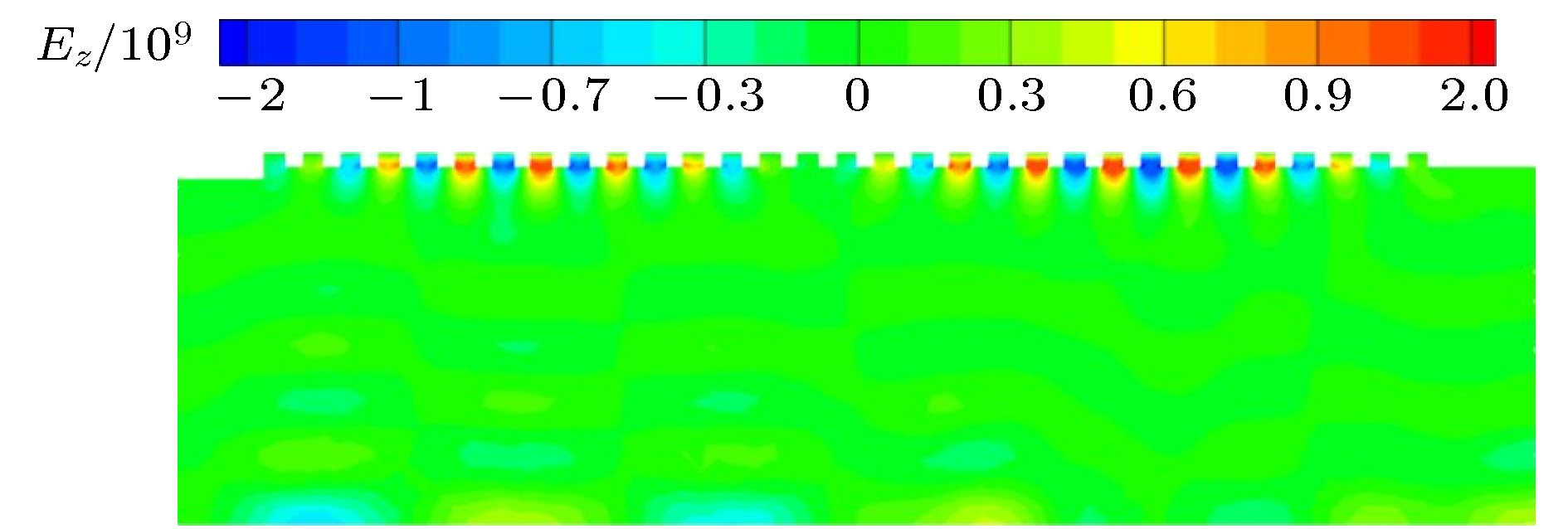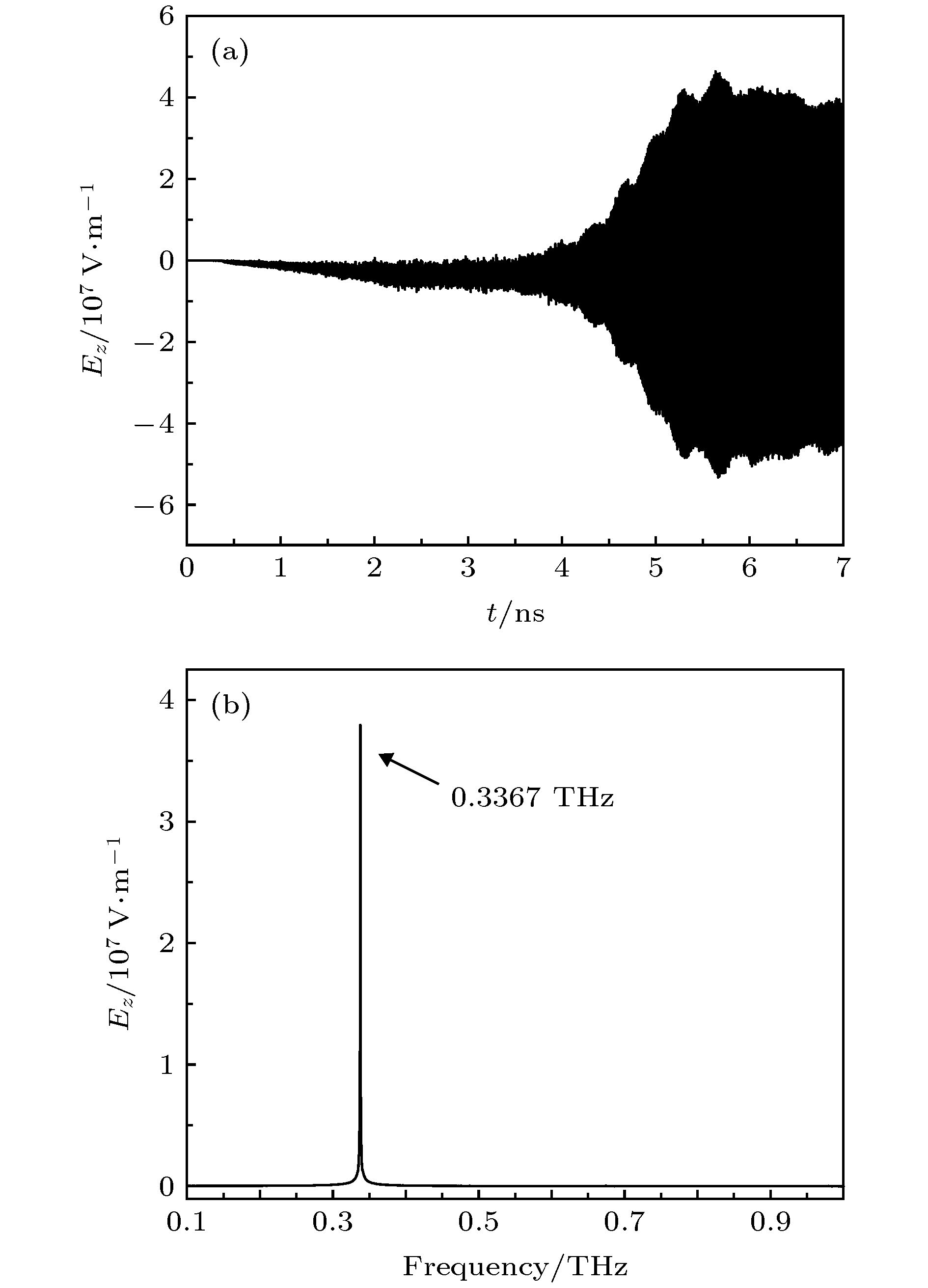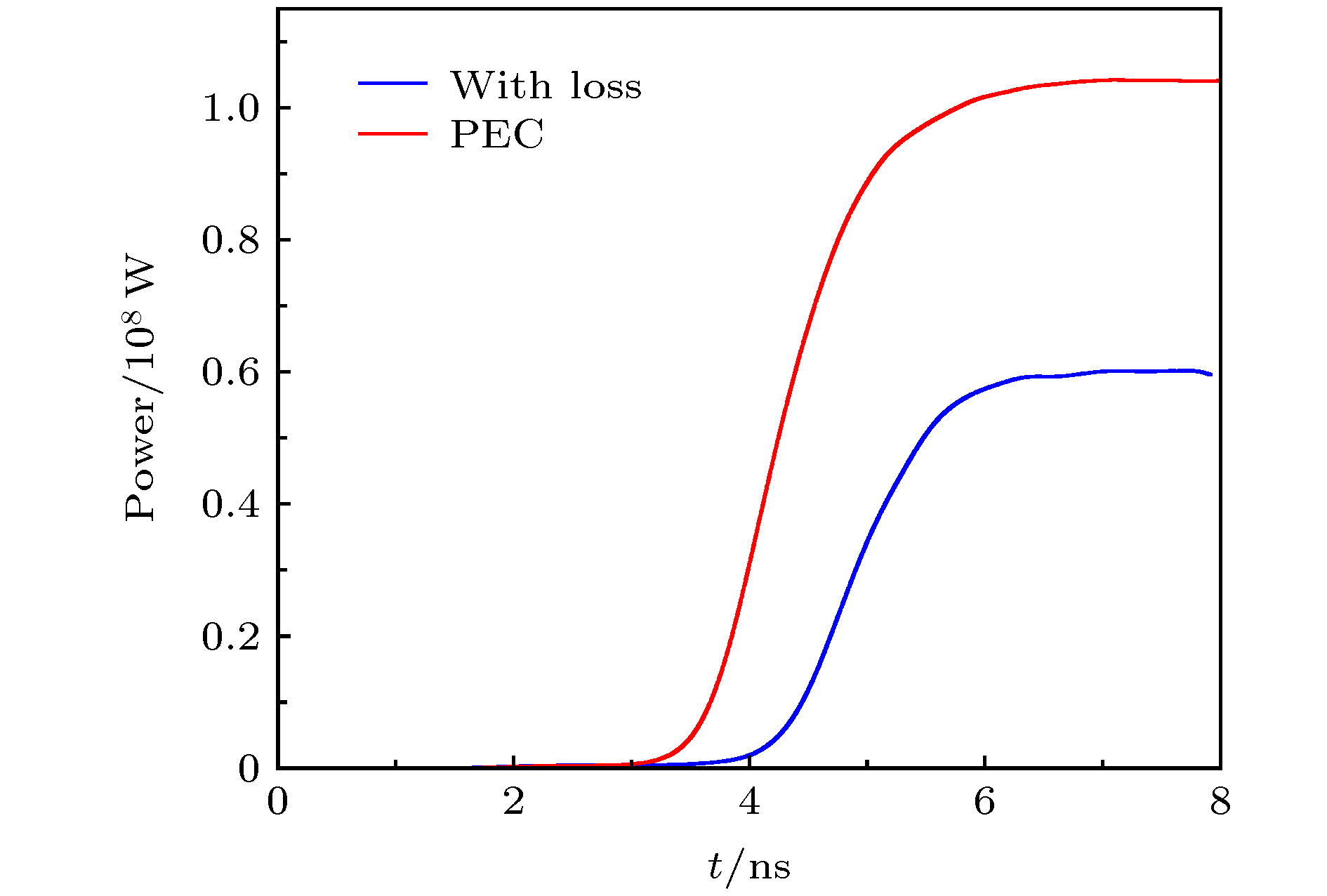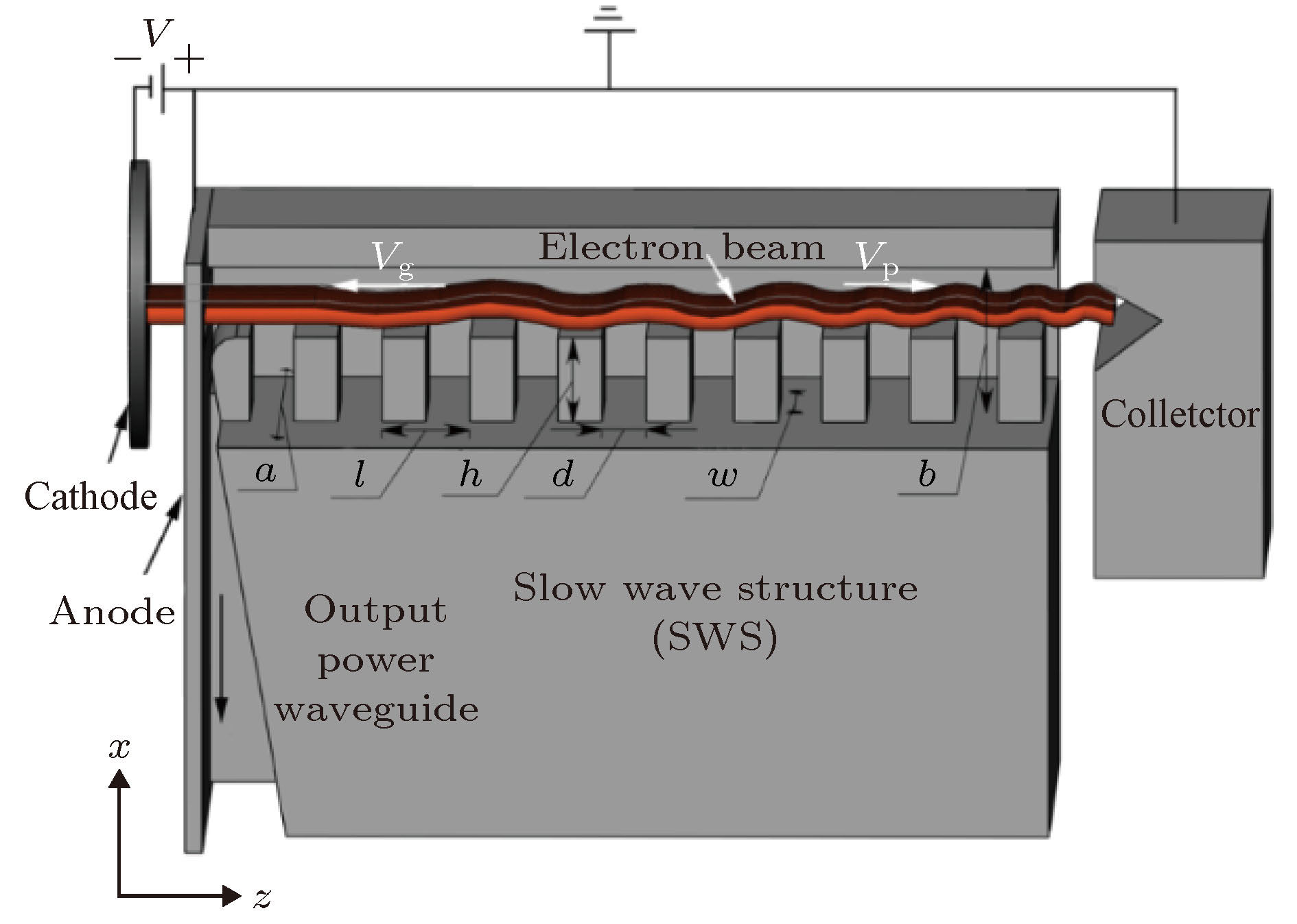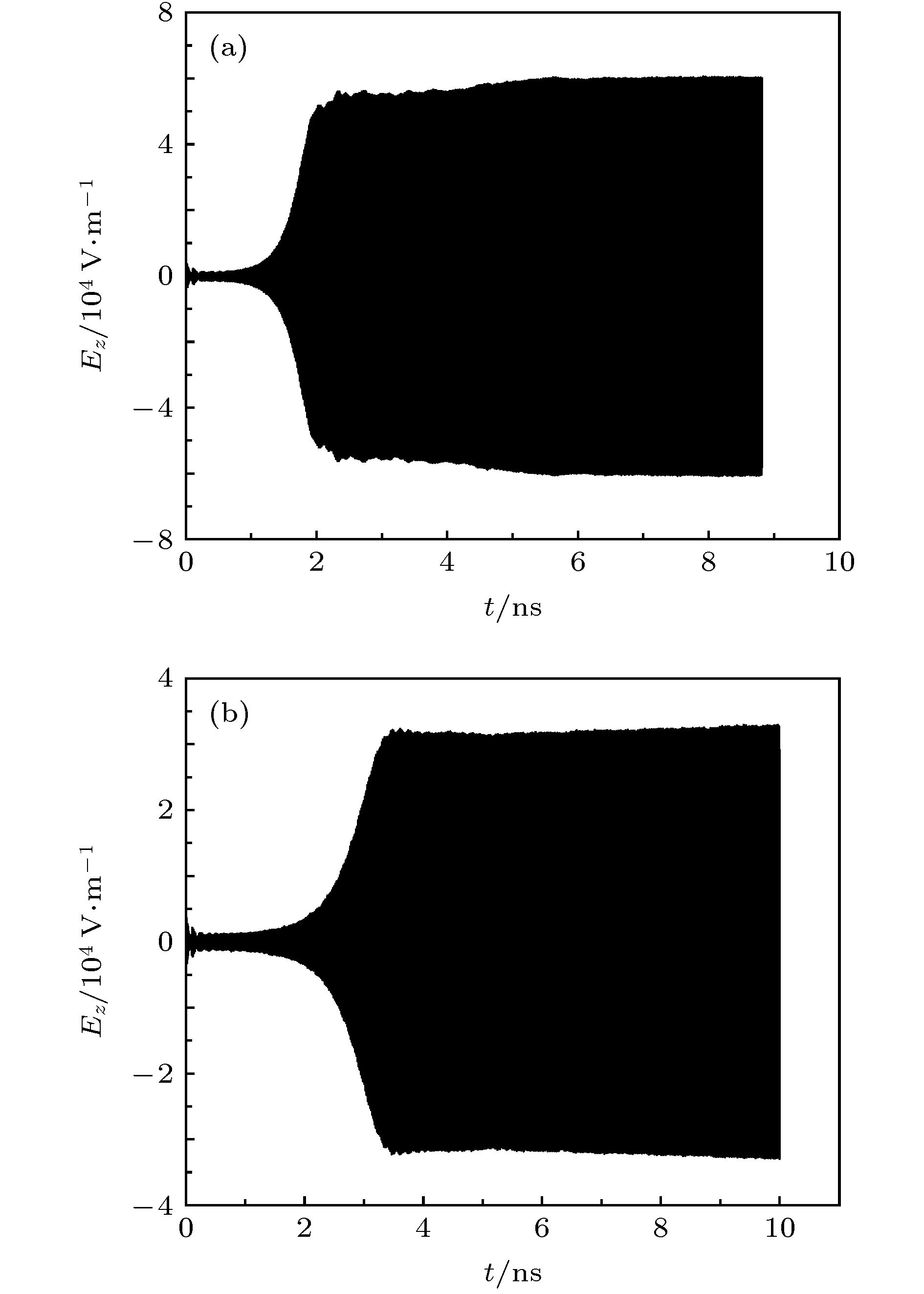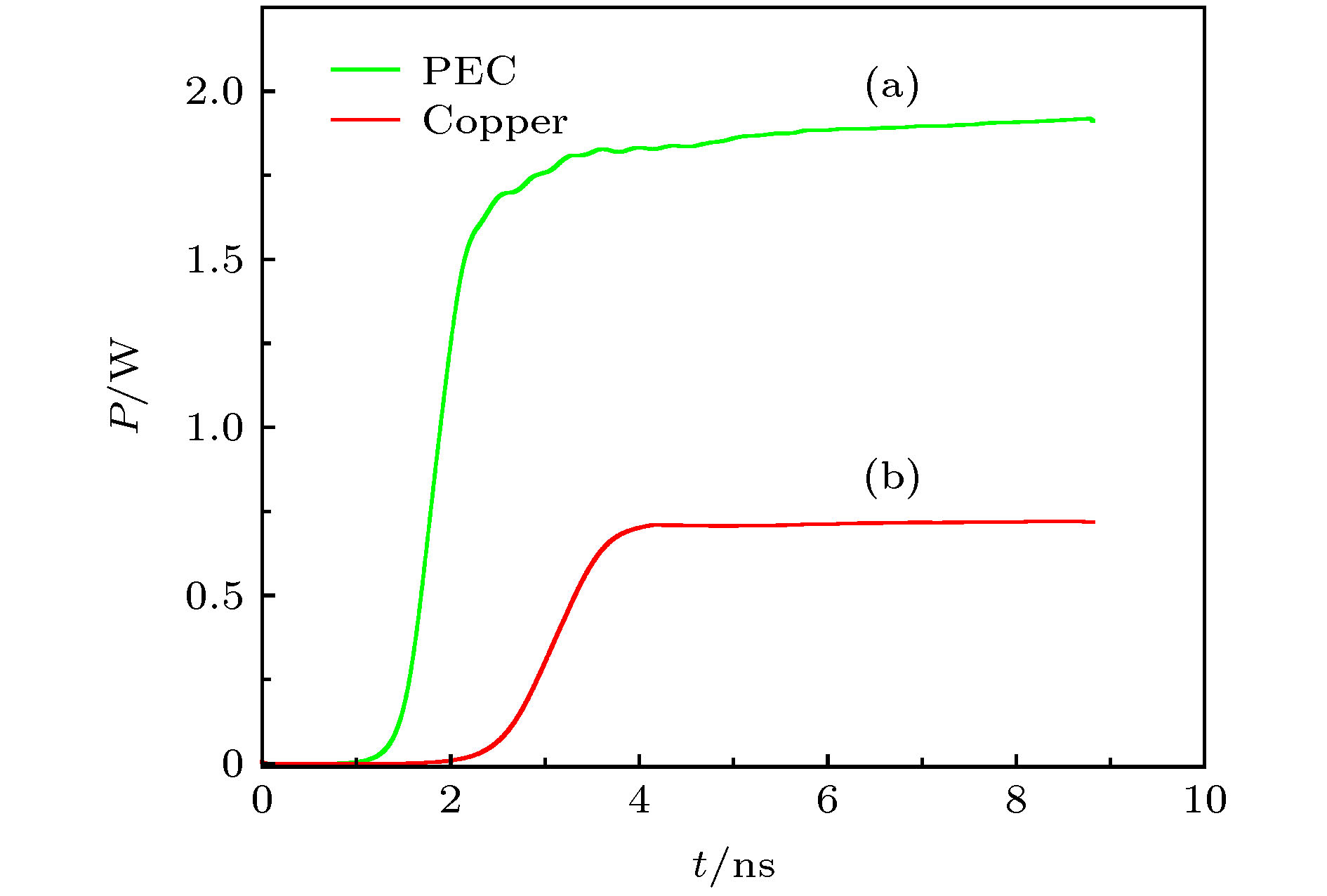-
为了研究欧姆损耗对高频真空电子器件工作特性的影响, 首先推导频率色散表面阻抗边界在三维共形粒子模拟软件UNIPIC-3D中的实现原理, 并通过对有耗边界矩形谐振腔和圆波导进行模拟验证了该阻抗边界算法的正确性. 采用有耗共形UNIPIC-3D模拟相对论太赫兹表面波振荡器和低电压平板格栅返波振荡器. 模拟结果表明, 对于表面波振荡器和平板BWO这种电磁场集中在金属慢波结构附近的太赫兹真空电子器件, 欧姆损耗会对器件的运行带来极大影响, 对于采用铜材料的器件, 输出功率会下降一半左右, 器件起振时间出现延迟, 但器件工作频率几乎不变. 为了提高相对论太赫兹表面波振荡器的效率, 在二极管和慢波结构之间增加了反射腔, 模拟结果表明, 在考虑器件表面损耗的条件下, 器件的工作频率保持不变, 输出功率由41 MW提高到60 MW.When the working frequency of vacuum electronic device reaches the terahertz frequency, the ohmic loss has a significant impact on the vacuum electronic device. To study the effect of the ohmic loss on the working characteristic of the vacuum electronic terahertz devices, this paper implements the frequency-dependent surface impedance boundary condition (SIBC) in the 3 dimensional particle in cell code UNIPIC-3D. Conformal mesh is adopted in the code to overcome the staircase error in traditional particle in cell method. By using the surface impedance boundary, we eliminate the need to study the field inside the lossy dielectric objects which require extremely small grid cells for numerical stability. In comparison with constant parameter SIBC, the dispersive SIBC is applicable over a very large frequency bandwidth and over a large range of conductivities. The correctness of the implementation is verified by simulating the lossy resonant cavity and circular waveguide, the simulated power loss is comparable with the theoretical predication. High power vacuum electronic devices of terahertz regime are attracting extensive interests due to their potential applications in science and technologies. The impulse-wave relativistic surface wave oscillator (SWO) and low-voltage continuous-wave planar grating backward wave oscillator (BWO) both made of copper are numerically studied by using UNIPIC-3D and dispersive surface impedance boundary condition. Numerical results show that the strongest field is very close to the slow wave structure where the beam-wave interaction occurs and that terahertz wave generates both in these two devices. The distributed wall loss has a considerable effect on the devices: the output power has a significant decrease and the startup time becomes longer, but the working frequencies of the two devices keep unchanged. To improve the efficiency of relativistic SWO, a resonant reflector is proposed between the diode and the slow wave structure. Numerical results show that the working frequency of the device with a resonant reflector keeps unchanged as the original one, but the output power increases to 60 MW from 41 MW of the original one when the ohmic loss is considered.
-
Keywords:
- surface impedance boundary /
- Ohmic loss /
- particle in cell /
- terahertz device /
- surface wave oscillator /
- BWO
[1] Siegel P H 2002 IEEE Trans. Microw. Theory Techn. 50 910
 Google Scholar
Google Scholar
[2] Booske J H, Dobbs R J, Joye C D, Kory C L, Neil G R, Park G, Park J, Temkin R J 2011 IEEE Trans. Terahertz Sci. Techn. 1 54
 Google Scholar
Google Scholar
[3] Li X Z, Wang J G, Sun J, Song Z M, Ye H, Zhang Y C, Zhang L J, Zhang L G 2013 IEEE Trans. Electron Dev. 60 2931
 Google Scholar
Google Scholar
[4] 李爽, 王建国, 童长江, 王光强, 陆希成, 王雪峰 2013 62 120703
 Google Scholar
Google Scholar
Li S, Wang J G, Tong C J, Wang G Q, Lu X C, Wang X F 2013 Acta Phys. Sin. 62 120703
 Google Scholar
Google Scholar
[5] 王光强, 王建国, 李爽, 王雪峰, 陆希成, 宋志敏 2015 64 050703
 Google Scholar
Google Scholar
Wang G Q, Wang J G, Li S, Wang X F, Lu X C, Song Z M 2015 Acta Phys. Sin. 64 050703
 Google Scholar
Google Scholar
[6] Wang J G, Wang G Q, Wang D Y, Li S 2018 Scientific Report 8 6978
 Google Scholar
Google Scholar
[7] Shin Y M, Zhao J F, Barnett L R, Luhmann N C 2010 Phys. Plasmas 17 123105
 Google Scholar
Google Scholar
[8] Xi H Z, He Z C, Wang J G, Li R, Zhu G, Chen Z G, Liu J S, Liu L W, Wang H 2017 Phys. Plasmas 24 033105
 Google Scholar
Google Scholar
[9] Zhang K C, Qi Z K, Yang Z L 2015 Chin. Phys. B 24 079402
 Google Scholar
Google Scholar
[10] Xi H Z, Wang J G, He Z C, Zhu G, Wang Y, Wang H, Chen Z G, Li R, Liu L W 2018 Scientific Reports 8 348
 Google Scholar
Google Scholar
[11] Birdsall K, Langdon A B 1985 Plasma Physics via Computer Simulation (New York: McGraw-Hill) pp7–32
[12] Goplen B, Ludeking L, Smithe D, Warren G 1995 Comp. Phys. Comm. 87 54
 Google Scholar
Google Scholar
[13] Verboncoeur J P, Langdon A B, Gladd N T 1995 Comp. Phys. Comm. 87 199
 Google Scholar
Google Scholar
[14] Wang J G, Zhang D H, Liu C L, Li Y D, Wang Y, Wang H G, Qiao H L, Li X Z 2009 Phys. Plasmas 16 033108
 Google Scholar
Google Scholar
[15] Wang J, Chen Z, Wang Y, Zhang D, Liu C, Li Y, Wang H, Qiao H, Fu M, Yuan Y 2010 Phys. Plasmas 17 073107
 Google Scholar
Google Scholar
[16] Na D Y, Omelchenko Y A, Moon H, Borges B H, Teixeira F L 2017 J. Comput. Phys. 346 295
 Google Scholar
Google Scholar
[17] Wang G Q, Wang J G, Li S, Wang X F 2015 AIP Advances 5 097155
 Google Scholar
Google Scholar
[18] 杨利霞, 马辉, 施卫东, 施丽娟, 于萍 2013 62 034102
 Google Scholar
Google Scholar
Yang L X, Ma H, Shi W D, Shi L J, Yu P 2013 Acta Phys. Sin. 62 034102
 Google Scholar
Google Scholar
[19] 闫玉波, 葛德彪, 柴玫 2001 电波科学学报 16 484
 Google Scholar
Google Scholar
Yan Y B, Ge D B, Chai M 2001 Chin. J. Radio Sci. 16 484
 Google Scholar
Google Scholar
[20] Mak J C, Sarris C D 2013 IEEE International Symposium on Antennas and Propagation & Usnc/ursi National Radio Science Meeting Orlando, USA, July 7−13 2013 p902
[21] Taflove A, Hagness S 2000 Computational Electrodynamics: the Finite Difference Time Domain Method (Norwood: Artech House) p67
[22] Beggs J H, Luebbers R J, Yee K S, Kunz K S 1992 IEEE Trans. Ant. Propag. 40 49
 Google Scholar
Google Scholar
[23] Wang Y, Wang J, Chen Z, Cheng G, Wang P 2016 Comput. Phys. Commun. 205 1
 Google Scholar
Google Scholar
[24] Zagorodnov I A, Schuhmann R, Weiland T 2007 J. Comput. Phys. 225 1493
 Google Scholar
Google Scholar
[25] Chen J, Wang J G 2007 IEEE Trans. Ant. Propag. 55 3613
 Google Scholar
Google Scholar
[26] Chen J, Wang J G 2007 IEEE Trans. Ant. Propag. 55 3603
 Google Scholar
Google Scholar
[27] Maloney J G, Smith G S 1992 IEEE Trans. Ant. Propag. 40 38
 Google Scholar
Google Scholar
[28] Benford J 2006 High Power Microwave (New York: Taylor & Francis) p124
[29] Wang J G, Wang Y, Zhang D H 2006 IEEE Trans. Plasma Sci. 34 681
 Google Scholar
Google Scholar
[30] Li X, Wang J, Xiao R, Wang G, Zhang L, Zhang Y, Ye H 2013 Phys. Plasmas 20 083105
 Google Scholar
Google Scholar
[31] Chen C, Xiao R, Sun J, Song Z, Huo S, Bai X, Shi Y, Liu G 2013 Phys. Plasmas 20 113113
 Google Scholar
Google Scholar
[32] Moreland L D, Schamiloglu E, Lemke W, Korovin S D, Rostov V V, Roitman A M, Hendricks K J, Spencer T A 1994 IEEE Trans. Plasma Sci. 22 554
 Google Scholar
Google Scholar
[33] Xiao R, Tan W, Li X, Song Z, Sun J, Chen C 2012 Phys. Plasmas 19 093102
 Google Scholar
Google Scholar
[34] Xiao R, Chen C, Tan W, Teng Y 2014 IEEE Trans. Electron Dev. 61 611
 Google Scholar
Google Scholar
[35] Song W, Chen C, Zhang L G, Hu Y, Yang M, Zhang X 2011 Phys. Plasmas 18 063105
 Google Scholar
Google Scholar
[36] Song W, Teng Y, Zhang Z, Li J, Sun J, Chen C, Zhang L 2012 Phys. Plasmas 19 083105
 Google Scholar
Google Scholar
-
表 1 圆波导中模拟Poynting通量与理论解的对比
Table 1. Comparison of simulated and analytic Poynting flux in a circular waveguide.
距离/cm 理论值/P0 模拟值/P0 相对误差/% 5 0.8964 0.8933 0.3 10 0.8035 0.7969 0.8 15 0.7203 0.7105 1.4 20 0.6457 0.6335 1.9 -
[1] Siegel P H 2002 IEEE Trans. Microw. Theory Techn. 50 910
 Google Scholar
Google Scholar
[2] Booske J H, Dobbs R J, Joye C D, Kory C L, Neil G R, Park G, Park J, Temkin R J 2011 IEEE Trans. Terahertz Sci. Techn. 1 54
 Google Scholar
Google Scholar
[3] Li X Z, Wang J G, Sun J, Song Z M, Ye H, Zhang Y C, Zhang L J, Zhang L G 2013 IEEE Trans. Electron Dev. 60 2931
 Google Scholar
Google Scholar
[4] 李爽, 王建国, 童长江, 王光强, 陆希成, 王雪峰 2013 62 120703
 Google Scholar
Google Scholar
Li S, Wang J G, Tong C J, Wang G Q, Lu X C, Wang X F 2013 Acta Phys. Sin. 62 120703
 Google Scholar
Google Scholar
[5] 王光强, 王建国, 李爽, 王雪峰, 陆希成, 宋志敏 2015 64 050703
 Google Scholar
Google Scholar
Wang G Q, Wang J G, Li S, Wang X F, Lu X C, Song Z M 2015 Acta Phys. Sin. 64 050703
 Google Scholar
Google Scholar
[6] Wang J G, Wang G Q, Wang D Y, Li S 2018 Scientific Report 8 6978
 Google Scholar
Google Scholar
[7] Shin Y M, Zhao J F, Barnett L R, Luhmann N C 2010 Phys. Plasmas 17 123105
 Google Scholar
Google Scholar
[8] Xi H Z, He Z C, Wang J G, Li R, Zhu G, Chen Z G, Liu J S, Liu L W, Wang H 2017 Phys. Plasmas 24 033105
 Google Scholar
Google Scholar
[9] Zhang K C, Qi Z K, Yang Z L 2015 Chin. Phys. B 24 079402
 Google Scholar
Google Scholar
[10] Xi H Z, Wang J G, He Z C, Zhu G, Wang Y, Wang H, Chen Z G, Li R, Liu L W 2018 Scientific Reports 8 348
 Google Scholar
Google Scholar
[11] Birdsall K, Langdon A B 1985 Plasma Physics via Computer Simulation (New York: McGraw-Hill) pp7–32
[12] Goplen B, Ludeking L, Smithe D, Warren G 1995 Comp. Phys. Comm. 87 54
 Google Scholar
Google Scholar
[13] Verboncoeur J P, Langdon A B, Gladd N T 1995 Comp. Phys. Comm. 87 199
 Google Scholar
Google Scholar
[14] Wang J G, Zhang D H, Liu C L, Li Y D, Wang Y, Wang H G, Qiao H L, Li X Z 2009 Phys. Plasmas 16 033108
 Google Scholar
Google Scholar
[15] Wang J, Chen Z, Wang Y, Zhang D, Liu C, Li Y, Wang H, Qiao H, Fu M, Yuan Y 2010 Phys. Plasmas 17 073107
 Google Scholar
Google Scholar
[16] Na D Y, Omelchenko Y A, Moon H, Borges B H, Teixeira F L 2017 J. Comput. Phys. 346 295
 Google Scholar
Google Scholar
[17] Wang G Q, Wang J G, Li S, Wang X F 2015 AIP Advances 5 097155
 Google Scholar
Google Scholar
[18] 杨利霞, 马辉, 施卫东, 施丽娟, 于萍 2013 62 034102
 Google Scholar
Google Scholar
Yang L X, Ma H, Shi W D, Shi L J, Yu P 2013 Acta Phys. Sin. 62 034102
 Google Scholar
Google Scholar
[19] 闫玉波, 葛德彪, 柴玫 2001 电波科学学报 16 484
 Google Scholar
Google Scholar
Yan Y B, Ge D B, Chai M 2001 Chin. J. Radio Sci. 16 484
 Google Scholar
Google Scholar
[20] Mak J C, Sarris C D 2013 IEEE International Symposium on Antennas and Propagation & Usnc/ursi National Radio Science Meeting Orlando, USA, July 7−13 2013 p902
[21] Taflove A, Hagness S 2000 Computational Electrodynamics: the Finite Difference Time Domain Method (Norwood: Artech House) p67
[22] Beggs J H, Luebbers R J, Yee K S, Kunz K S 1992 IEEE Trans. Ant. Propag. 40 49
 Google Scholar
Google Scholar
[23] Wang Y, Wang J, Chen Z, Cheng G, Wang P 2016 Comput. Phys. Commun. 205 1
 Google Scholar
Google Scholar
[24] Zagorodnov I A, Schuhmann R, Weiland T 2007 J. Comput. Phys. 225 1493
 Google Scholar
Google Scholar
[25] Chen J, Wang J G 2007 IEEE Trans. Ant. Propag. 55 3613
 Google Scholar
Google Scholar
[26] Chen J, Wang J G 2007 IEEE Trans. Ant. Propag. 55 3603
 Google Scholar
Google Scholar
[27] Maloney J G, Smith G S 1992 IEEE Trans. Ant. Propag. 40 38
 Google Scholar
Google Scholar
[28] Benford J 2006 High Power Microwave (New York: Taylor & Francis) p124
[29] Wang J G, Wang Y, Zhang D H 2006 IEEE Trans. Plasma Sci. 34 681
 Google Scholar
Google Scholar
[30] Li X, Wang J, Xiao R, Wang G, Zhang L, Zhang Y, Ye H 2013 Phys. Plasmas 20 083105
 Google Scholar
Google Scholar
[31] Chen C, Xiao R, Sun J, Song Z, Huo S, Bai X, Shi Y, Liu G 2013 Phys. Plasmas 20 113113
 Google Scholar
Google Scholar
[32] Moreland L D, Schamiloglu E, Lemke W, Korovin S D, Rostov V V, Roitman A M, Hendricks K J, Spencer T A 1994 IEEE Trans. Plasma Sci. 22 554
 Google Scholar
Google Scholar
[33] Xiao R, Tan W, Li X, Song Z, Sun J, Chen C 2012 Phys. Plasmas 19 093102
 Google Scholar
Google Scholar
[34] Xiao R, Chen C, Tan W, Teng Y 2014 IEEE Trans. Electron Dev. 61 611
 Google Scholar
Google Scholar
[35] Song W, Chen C, Zhang L G, Hu Y, Yang M, Zhang X 2011 Phys. Plasmas 18 063105
 Google Scholar
Google Scholar
[36] Song W, Teng Y, Zhang Z, Li J, Sun J, Chen C, Zhang L 2012 Phys. Plasmas 19 083105
 Google Scholar
Google Scholar
计量
- 文章访问数: 11867
- PDF下载量: 76
- 被引次数: 0














 下载:
下载:
